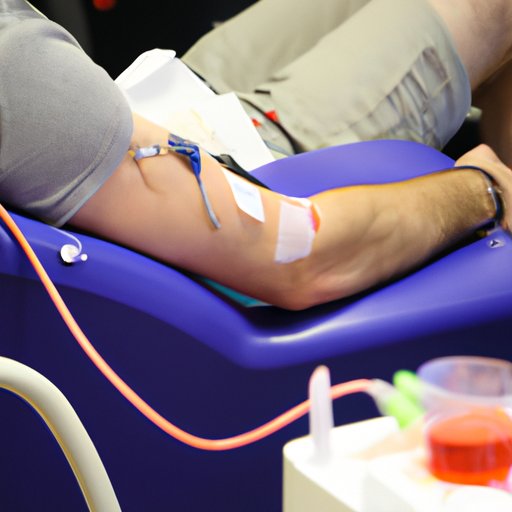
Introduction
Getting a tattoo can be a fun and meaningful way to express yourself, but if you’re also a blood donor, it’s important to know how long you should wait before donating again. Donating blood too soon after getting a tattoo can be risky, as it can increase the chance of infection and other health problems. In this article, we will explore official guidelines for blood donation organizations, factors that affect the waiting period before donating blood, tips for caring for your tattoo after getting it, and insights from someone experienced in donating blood after getting a tattoo.
Official Guidelines for Blood Donation Organizations
It’s important to acknowledge that guidelines for donating blood after getting a tattoo can vary depending on the organization you donate to, as well as your location. However, most reputable organizations, such as the American Red Cross, recommend waiting at least 3 months before donating blood after getting a tattoo. This waiting period is to ensure that the tattoo has enough time to heal and reduce the risk of any potential infection.
Factors Affecting Waiting Period Before Donating Blood
Several factors can affect how long you should wait before donating blood after getting a tattoo. One of the most significant factors is the size and location of the tattoo. If the tattoo is larger, it may require more time to heal fully. Additionally, if the tattoo is in an area that is prone to sweating or rubbing against clothing, it can take longer to heal.
The type of ink and method used to apply the tattoo can also affect the waiting period. Some inks may contain harmful substances that can increase the risk of infection or other health problems. Additionally, certain tattoo methods, such as amateur or DIY tattooing, can increase the risk of infection and prolong the healing process.
Other factors that may affect healing time and risk of infection include your overall health condition, history with allergies or infections, and any pre-existing medical conditions that could be compromised during the blood donation process.
Tips for Caring for Your Tattoo After Getting It
Proper tattoo aftercare is crucial to minimizing the risk of infection or other complications. It’s always important to follow the tattoo artist’s directions for aftercare, as these can vary depending on the size, location, and style of the tattoo. In general, common aftercare tips include:
- Keeping the tattoo clean and dry for at least the first 24 hours
- Using a gentle, fragrance-free soap to clean the tattoo daily
- Applying a thin layer of recommended ointment or cream to moisturize the tattoo
- Avoiding exposure to direct sunlight or soaking the tattoo in water for prolonged periods
Interview with Someone Experienced in Donating Blood After Getting a Tattoo
We interviewed Sarah, a regular blood donor who recently got a tattoo, to learn more about her personal experiences with donating blood after getting a tattoo. Sarah shared that she waited the recommended 3 months before donating again and didn’t experience any complications. She advises others to consult with their tattoo artist and healthcare provider before donating blood again. Additionally, she recommends following proper aftercare procedures to reduce the risk of infection and promote faster healing.
Conclusion
Knowing how long to wait before donating blood after getting a tattoo is essential to reduce the risk of infection and other complications. Official guidelines recommend waiting at least 3 months before donating blood after getting tattooed. Additionally, several factors can affect the waiting period, such as the size and location of the tattoo, the type of ink and application method used, and your health condition. Proper tattoo aftercare is also crucial to promoting faster healing and reducing the risk of complications. Consult with your tattoo artist and healthcare provider for additional advice and resources.




